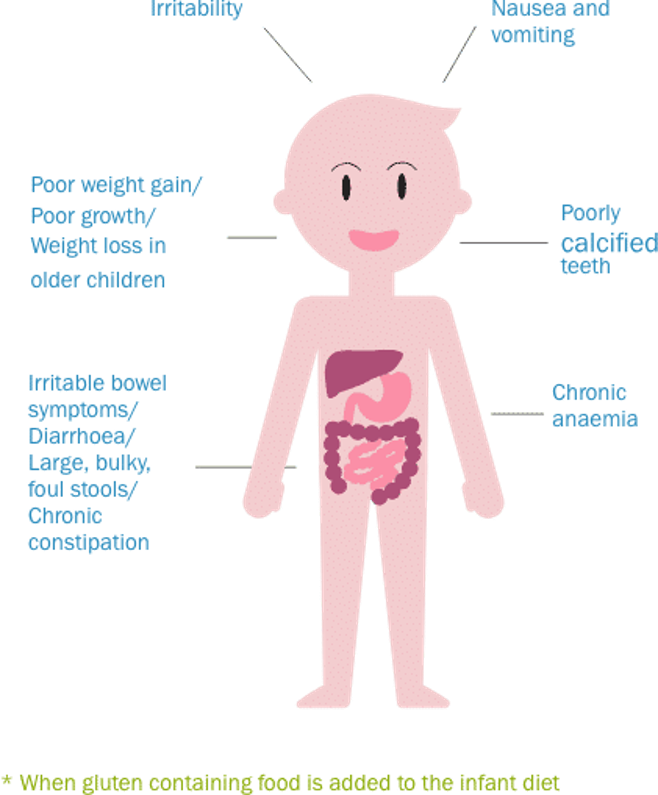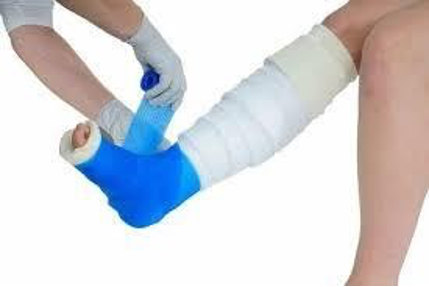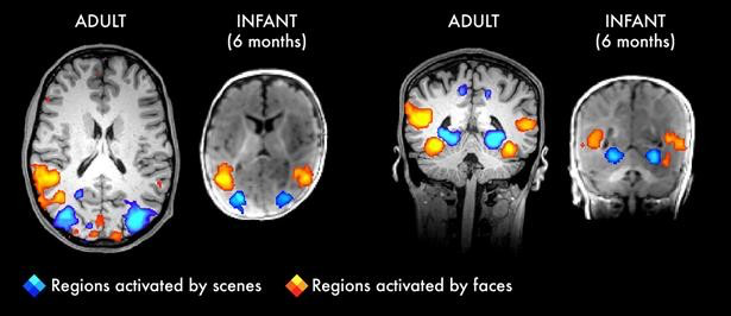The nurse notes on assessment that a 1-year-old child underweight with abdominal distention, thin legs and arms, and foul-smelling stools. The nurse suspects failure to thrive is associated with
Intussusception
imperforate anus
celiac disease
table bowel syndrome
The Correct Answer is C
Celiac disease is an autoimmune disorder triggered by the ingestion of gluten, a protein found in wheat, barley, and rye. It causes damage to the lining of the small intestine, leading to malabsorption of nutrients. The characteristic symptoms of celiac disease include abdominal distention, underweight or failure to thrive, thin arms and legs, and foul-smelling stools.
intussusception in (option A) is incorrect because it, refers to a condition where a portion of the intestine telescopes into an adjacent section, causing an obstruction. While intussusception can present with symptoms such as abdominal pain, vomiting, and currant jelly-like stools, it is not typically associated with failure to thrive.
imperforate anus, in (option B) is incorrect because it is a congenital condition in which the opening of the anus is blocked or absent. It can cause difficulties with passing stools, but it is not typically associated with failure to thrive or the specific assessment findings described.
irritable bowel syndrome (IBS) in (option D) is incorrect because it, is a chronic disorder of the gastrointestinal tract characterized by recurrent abdominal pain, changes in bowel habits, and bloating. While IBS can cause gastrointestinal symptoms, it is not typically associated with failure to thrive, underweight, or the specific assessment findings mentioned.

Nursing Test Bank
Naxlex Comprehensive Predictor Exams
Related Questions
Correct Answer is B
Explanation
The primary concern when it comes to a synthetic cast is to keep it dry during bathing or showering. Moisture can weaken the cast material and lead to skin irritation or infection. Therefore, covering the cast with plastic and waterproof tape helps to protect it from getting wet.
Applying a heating pad to the cast if the child has swelling in the affected extremity in (Option A) is incorrect because applying a heating pad to the cast can increase the risk of burns and is not recommended. If the child has swelling in the affected extremity, it is important to elevate the limb and follow any specific instructions provided by the healthcare provider.
Splitting the cast if the child complains of numbness or pain in (Option C) is also incorrect. Splitting the cast, or attempting to modify or adjust it, should not be done without medical supervision. If the child complains of numbness or pain, it is important to notify the healthcare provider for further evaluation and appropriate management.
|
Wrapping the outer surface of the cast with an Ace bandage in (Option D) is incorrect as well. Wrapping the outer surface of the cast with an Ace bandage or any additional material is not recommended unless specifically instructed by the healthcare provider. It can affect the fit of the cast, alter the healing process, and potentially cause complications |

Correct Answer is A
Explanation
The statement that accurately describes the difference between the central nervous system (CNS) of a child and an adult is option A. The brain of a term infant weighs less than half of the weight of the adult brain. The brain undergoes significant growth and development during childhood and continues to develop until early adulthood. At birth, the brain is only a fraction of its adult weight, and it continues to grow and mature over time.
infant has 150 mL of cerebrospinal fluid (CSF) compared with 50 mL in the adult in (option B), is incorrect. The volume of CSF in the CNS is not a significant difference between children and adults.
coordination and fine motor skills develop as myelination of peripheral nerves progresses in (option C), is an incorrect statement. Myelination is an ongoing process that occurs throughout childhood and contributes to the development of coordination and fine motor skills.
papilledema is a common manifestation of increased intracranial pressure (ICP) in the very young child in (option D), is not correct. Papilledema refers to swelling of the optic disc and is not commonly seen in very young children. Signs of increased ICP in young children may present differently compared to adults and can include altered mental status, irritability, vomiting, and changes in vital signs.

Whether you are a student looking to ace your exams or a practicing nurse seeking to enhance your expertise , our nursing education contents will empower you with the confidence and competence to make a difference in the lives of patients and become a respected leader in the healthcare field.
Visit Naxlex, invest in your future and unlock endless possibilities with our unparalleled nursing education contents today
Report Wrong Answer on the Current Question
Do you disagree with the answer? If yes, what is your expected answer? Explain.
Kindly be descriptive with the issue you are facing.
